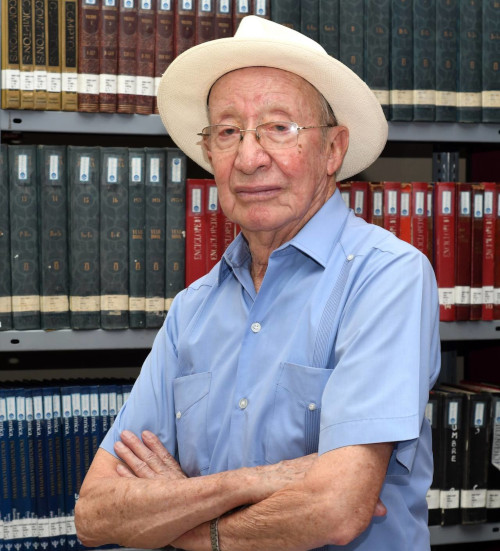Rodrigo Abelardo Pesántez Rodas (Azogues, July 25, 1937 – Guayaquil, April 2, 2020) was an Ecuadorian writer, poet, literary critic, anthologist, researcher, university professor, and cultural promoter. He’s best known for his essays and for publishing poetry anthologies containing poems by Ecuadorians. He is especially remembered as an exponent and champion of Ecuadorian women writers. His book, “Presencia de la mujer ecuatoriana en la poesía” (1960), is a poetry anthology that contains poems by 67 Ecuadorian women writers. Other books by him include: “Panorama del ensayo ecuatoriano,” “Ocho poetas tanáticas,” “Jorge Carrera Andrade, amistad y anhelos compartidos,” and “Siete poetas del Ecuador.” As a poet, his poetry books include “Viñas de Orfeo,” “De cuerpo entero,”and “Vigilia de mi sombra.” Among the many awards he received are: the José Vasconcelos Award (an international award from Mexico) and the National Cultural Merit Medal from the House of Ecuadorian Culture. For forty years, he taught Ecuadorian Literature at the University of Guayaquil. He was a member of the House of Ecuadorian Culture.
Early Life and Education
Rodrigo Pesántez Rodas, born to Abelardo Pesantez Garzón and Lola Rodas Iglesias on July 25, 1937, in Azogues, Ecuador, demonstrated a passion for literature and the arts from an early age. He completed his primary and secondary education in his hometown before pursuing further studies in Guayaquil. On September 4, 1964, he earned the distinguished title of Doctor of Philosophy, Letters, and Educational Sciences. This comprehensive education equipped Pesántez Rodas with the knowledge and foundation necessary for his significant contributions to Ecuadorian literature and culture.
Literary Career
Rodrigo Pesántez Rodas’ literary journey was multifaceted, encompassing various roles as a writer, poet, and researcher. Through his extensive body of work, he made significant contributions to Ecuadorian literature.
Pesántez Rodas explored diverse genres, crafting thought-provoking essays that shed light on Ecuadorian literary traditions and their historical contexts. His influential book, “Panorama del ensayo ecuatoriano,” stands as a testament to his dedication to documenting and analyzing the rich tapestry of Ecuadorian literary heritage. With meticulous research and insightful analysis, Pesántez Rodas provided valuable perspectives that deepened the understanding of Ecuador’s literature.
Pesántez Rodas’ poetry books include “Viñas de Orfeo,” “De cuerpo entero,” and “Vigilia de mi sombra.” In 2009, Rodrigo Abelardo Pesántez Rodas reissued the work of Jacinto de Evia (1675), widely regarded as the first Ecuadorian poet. This reissue took place in Spain, bringing renewed attention to the literary contributions of Jacinto de Evia and shedding light on the early poetic traditions of Ecuador.
Awards and Merits
Rodrigo Pesántez Rodas’ immense contributions to literature and culture garnered widespread recognition. He was the recipient of numerous awards and merits that celebrated his excellence and the impact of his work.
Among the notable honors he received was the José Vasconcelos Award, a prestigious international accolade bestowed upon him in 1996 by the Front of Hispanic Affirmation A.C. from Mexico. This esteemed recognition acknowledged Pesántez Rodas’ substantial contributions as a literary critic, poet, and researcher. It solidified his position as a revered figure not only in Ecuador but also on an international scale.
Additionally, Pesántez Rodas was honored with the National Cultural Merit Medal from the House of Ecuadorian Culture. This recognition celebrated his tireless efforts in promoting Ecuadorian literature, preserving cultural heritage, and inspiring future generations of writers and scholars.
Death
Tragically, Rodrigo Abelardo Pesántez Rodas passed away on April 2, 2020, in Guayaquil, falling victim to the COVID-19 pandemic that ravaged Ecuador and the world during that time. His untimely death was a profound loss for the literary community, depriving it of a luminary who had devoted his life to celebrating and preserving the diverse voices of Ecuadorian literature.
Selected Works
Poetry books
- Viñas de Orfeo: A poetry book by Pesántez Rodas.
- De cuerpo entero: A collection of poetry written by Pesántez Rodas.s.
- Vigilia de mi sombra: A collection of poetry written by Pesántez Rodas.
Anthologies he compiled or edited
- Presencia de la mujer ecuatoriana en la poesía (1960): An anthology of poetry that showcases the works of 67 Ecuadorian women writers.
- Espirales Poéticas: Joven Poesía Ecuatoriana (1960): An anthology featuring the poetry of young Ecuadorian writers. Among the poets featured in this anthology are: Rafael Díaz Icasa, David Ledesma Vazquez, Ileana Espinel, Sergio Román, Nancy Carlín Iglesias, Fernando Cazon Vera, Agustín Vulgarín Marín, Ana María Iza, Miguel Donoso Pareja, Antonio Preciado, Leon Hi-Fong, Euler Granda, to name a few.
- Ocho poetas tanáticas: A collection featuring the works of eight poets.
- Siete poetas del Ecuador: An anthology highlighting the works of seven Ecuadorian poets.
Essay
- Panorama del ensayo ecuatoriano: A comprehensive exploration of Ecuadorian essay writing.
- Jorge Carrera Andrade, amistad y anhelos compartidos: A book discussing the friendship and shared aspirations between Pesántez Rodas and Jorge Carrera Andrade.

